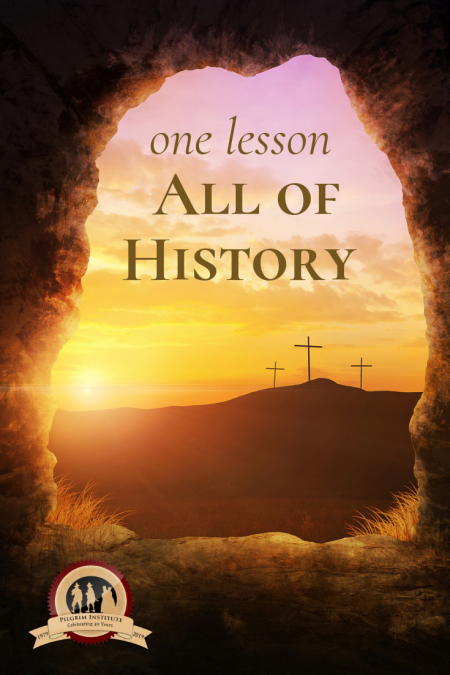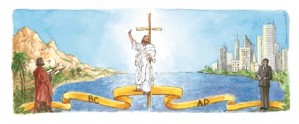
One Lesson – All of History
One’s view of history, founded on his view of God, is of utmost importance. Here are a few points to consider:·
- It determines his hope for the future
- It provides perspective regarding men and nations – past, present and future
- It helps us know how to live in liberty
These points simply scratch the surface on this topic. Consider this question:·
What is the focus of all history?
Is it man and his achievements? Or, is it God’s story of redeeming pagan man and enabling him to walk in liberty?
Pagan man, left to himself, creates a society centered on the struggle for power. Ancient history is a long story of men setting out to conquer and control other men.
The resulting society reflected this pagan way of thinking:
- Social order rested on the assumed natural inequality of man
- The individual was regarded of value only as he contributed to the State
- The flow of power from the top down oppressed ordinary citizens
- The State sought to control the thoughts and actions of its people *
Into this pagan world, God sent His son to redeem man. As men were set free spiritually from the bondage of sin, they learned to walk in self government.
As they submitted themselves to the rule of Christ internally, their minds were renewed. Old ideas were replaced with new ideas.
In time, spiritual liberty brought about new kinds of liberty the world had never seen: religious, political, civil and economic.
The results reached all the way to the establishment of the world’s first Christian republic reflecting distinctively Christian ideas:
- Man was created in the Divine image
- In the eye of God, all men are equal
- The individual has independent value
- Freedom is the native right of man
- Man is superior to the state, which ought to be fashioned for his use
- The State exists for its citizens
- Justice, protection, and the common good are the purpose for civil government *
Christ, then, is the focus of all history.
Ancient history records mankind’s struggle with his fallen nature. Middle, medieval, and modern history record God working to transform the hearts of men.
The transformation extended from individual hearts to homes, churches, and nations. The years of history are counted in relation to Christ. In our history book The Mighty Works of God: Divine Providence, we share this idea:
Christ Changed History
“Christ’s coming to earth is the most important event of all history. All events, before and after Christ, point to His coming.”

“As a person accepts the gift of salvation, his heart is changed. The Holy Spirit helps us to be governed by the Word of God. Jesus’ death on the cross made the way for each person to be governed in his heart. This is self government. . . .
“Many centuries after Christ, God brought forth a nation built upon the idea that people could govern themselves. The foundation of this nation was Christ and Christianity.”
To help build your student’s understanding of Christ as the focus of all history, use these pages to guide their reasoning, relate the idea to history and to themselves, and record their thinking on the timeline we’ve provided for you.
The lesson may be tailored to the age of your students. Older students could discuss the pagan and Christian ideas of man and government, researching Biblical documentation of the Christian ideas. Challenge them to draw evaluate nations in history based on the pagan and Christian views of man and government.
Suggested essay question for older students:·
How does history reflect that Christ changed history?
As you utilize this lesson, please let hear from you. Comment on Facebook and let us know how you helped your student see all of history summed up in one lesson – Christ is the focal point.
Find more valuable resources for your family and friends:
____________________________
* Richard Frothingham, “The Rise of the Republic of the United States,” in Christian History of the Constitution: Christian Self-Government, Verna M. Hall (San Francisco: Foundation for American Christian Education, 1975), pages 1-2.
<><><><><><><><><><><><><><><><><><><><><><><><><><><><><><><><>

MRS. JEANETTE WHITTAKER inspires both children and adults with her interest in Biblical thinking and her passion for literature and learning. As a young teenager, she was challenged by her pastor to a conviction that the Word of God speaks to every aspect of life–including both individuals and institutions. This conviction prompts her to encourage others in the practice of Biblical research and reasoning regarding educational disciplines, topics of interest, qualities of character, and more. Her own education from an American Christian philosophy, combined with her ability as a captivating story-teller, makes her a welcome speaker on both historic and literary subjects. She currently serves in leadership for Pilgrim Institute, a ministry she has been part of since 1983. In addition to 10 years of classroom teaching at both elementary and secondary levels, she currently educates her two children at home. She is also a contributing author toThe Mighty Works of God Providential history series for children, and is the co-author of An American Christian Approach for Teaching Christopher Columbus in the Primary Grades.
I appreciated Jeanette Whittaker’s writing, her summation, the learning questions to answer, and all the links to other ways to learn.